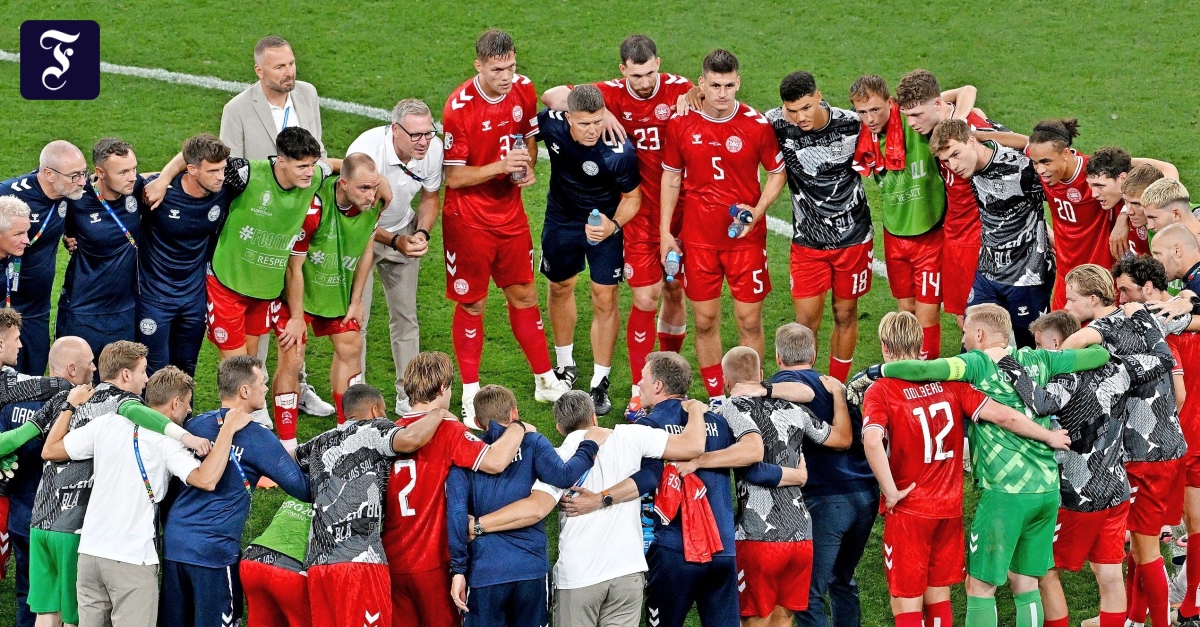Es war schon kurz nach Mitternacht, aber Kasper Hjulmand hatte es nicht eilig, die Münchner Arena zu verlassen. „Es geht jetzt erst einmal darum, das zu genießen“, sagt der dänische Trainer. Er meinte den Einzug ins Achtelfinale der EM.
Ein Medienbeauftragter schien dafür nur bedingt Verständnis zu haben. Er versuchte, Hjulmand dazu zu bewegen, endlich den wartenden Bus zu besteigen. Immer hektischer wurden seine Zeichen. Aber der Trainer ließ sich am Dienstag Zeit und beantwortete alle Fragen geduldig – sogar auf Deutsch, obwohl er bisher bei dieser EM gerne darauf hingewiesen hat, dass er nicht mehr so geübt sei und deshalb lieber auf Englisch antworte.
Entweder Hjulmand hat ein bisschen geübt in den vergangenen Tagen oder einfach untertrieben, denn sein Deutsch ist auch zehn Jahre nach seinem Engagement bei Mainz 05 noch sehr gut. „Es muss allen klar sein, dass es nicht selbstverständlich war, hier weiterzukommen“, sagte er nach dem 0:0 gegen Serbien, das Dänemark als Gruppenzweiter ein Duell mit Deutschland im Achtelfinale am Samstag (21.00 Uhr im F.A.Z.-Liveticker zur Fußball-EM, im ZDF und bei MagentaTV) bescherte.
Wir müssen effektiver werden“
Captain Christian Eriksen, scorer of one of Denmark's two goals in the tournament, put it more concretely. “We have to be more effective.” However, the team only conceded two goals. This “very good defense”, says Leipzig Yusuf Poulsen“It is the basis for advancing in a tournament.”
The opponent's previous appearances must be by national selectors. Julian Nagelsmann Don't worry. More like the image that the Danes have of themselves. Hjulmand sees a competitive advantage “based on our cohesion.” This feeling of unity, he stated before the start of the Euro Cup, “is our strength.” A look at history confirms the technician. “We play for the big moments,” says Thomas Delaney. He was already there when the Scandinavians reached the semi-finals of the European Championship three years ago and were unfortunately eliminated by England due to a controversial penalty. “When we play against big nations, we always give our best,” Hjulmand said.
The story of Denmark's greatest moments began 40 years ago with German coach Sepp Piontek. At the 1984 European Championship they reached the semi-finals, but were defeated by Spain on penalties. Eight years later, the Danes, under the direction of coach Richard Möller Nielsen, revolutionized European football.
Preferably in the role of outsider.
In no time, they made it into the eight-team tournament, replacing Yugoslavia, which had been excluded due to the Balkan war. In the preliminary round, they beat France and England and defeated the Netherlands in the semi-finals and final. The final: which German football fan doesn't know that? – Berti Vogts' favourite team. It is true that Möller Nielsen brought his players back from holiday ten days before the start of the tournament and asked them before the first match not to embarrass the nation, but the Danes were not as unprepared as legend has it.
You seem to be comfortable in the role of the outsider. In the 19 years between the Euro title and the 2021 semi-finals, they have only survived the group stage once. Teams like Denmark may find it easier to react than to act, but that will only get them further if they also manage to exploit their opponents' weaknesses. Hjulmand and his players did this perfectly against England in the second group game. Coach Gareth Southgate's team, which started the Euros as one of the heavy favourites, has so far stumbled through the tournament.

